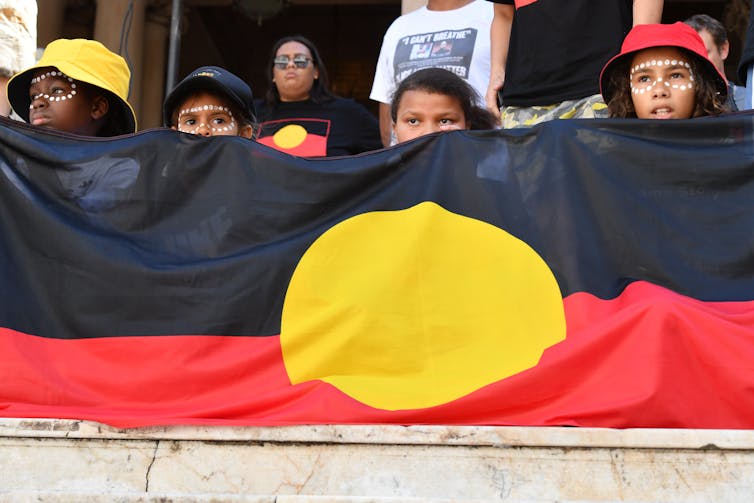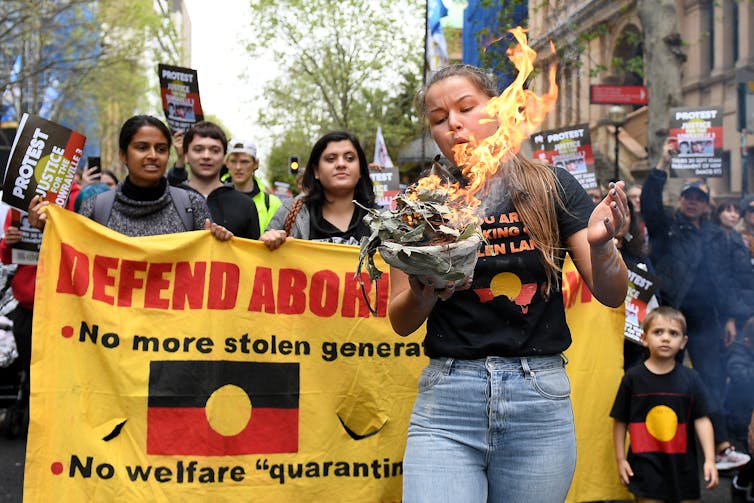First Nations families need support to stay together, before we create another Stolen Generation
- Written by Catherine Chamberlain, Associate Professor Indigenous Health Equity, La Trobe University
Aboriginal and Torres Strait Islander (First Nations) children are increasingly being removed[1] from their families and placed into out-of-home care, raising concerns of another Stolen Generation[2].
One of the main reasons is reporting to child protection services before a child is born, with separation of infants from their parents shortly after birth. This is a national crisis reflecting systemic failures, discrimination, impacts of colonisation and harmful policies, including the Stolen Generations[3].
We must take meaningful steps to enshrine the full intent of the Secretariat of National Aboriginal and Islander Child Care’s[4] Aboriginal and Torres Strait Islander Child Placement Principle[5] in legislation and implementation in practice.
Another Stolen Generation
In 2018-19, one in five First Nations children removed into out-of-home care was less than one year old. The same year, First Nations infants were removed at a rate of 44.1 per 1,000[6] – nine times that of non-Indigenous infants.
This represents failed progress towards the Closing the Gap target[7] to reduce over-representation of First Nations children in out-of-home care by 45% by 2031. Rather, the gap is widening and urgent reforms are needed.
Professor Megan Davis questions[8] whether Australia is meeting its obligations as a United Nations member and signatory to the UN Convention on the Rights of the Child[9]. As she wrote,
Maintaining the best interests of the child and the integrity of Indigenous families and communities should be primary considerations in development, social families and health and education programmes.
 The safety, love and nurturing of First Nations children is paramount.
Mick Tsikas/ AAP Images[10]
The safety, love and nurturing of First Nations children is paramount.
Mick Tsikas/ AAP Images[10]
Fear of child protection services
Child protection “risk assessment” guidelines are driving increased notifications[11] from health services. These can be triggered[12] by parental homelessness, previous involvement with child protection services (as a child or adult), mental ill-health, young parenthood, cognitive impairment, substance use or family violence.
Prenatal child protection notifications are made to ensure families get support. However, fear of child protection services is a barrier to this support[13]. Many “risk factors” are directly related[14] to socio-economic deprivation, inadequate access to the social aspects of health, and systemic discrimination.
Child protection responses are often punitive, removing an infant if the mother cannot comply with directives.
For example, identifying family violence is crucial, but notifications can be used as an additional threat against mothers by their perpertrators[15] in coercive relationships. Child protection involvement is then experienced as further (systemic) violence, rather than care.
Increasing fear[16] of losing a baby is likely to discourage women from disclosing domestic violence to welfare workers, putting lives at greater risk[17]. Responses to threats (for example, fight, flight or freeze) can also negatively affect maternal and fetal health[18] and behaviour.
Read more: Victoria's truth-telling commission: to move forward, we need to answer for the legacies of colonisation[19]
Lack of culturally safe support for families
In a survey of perinatal health care workers[20], 98% reported that trauma, stress and grief significantly impacted First Nations parents - yet only 43% were not satisfied their service could address these issues.
Other issues that need to be addressed[21] include:
a lack of culturally safe support for mothers before or after they are separated from their child. Some babies are removed shortly after birth without the mother even being told this was being considered
a lack of transparency, accountability and documentation by child protection services.
These systemic failures lead to immeasurable pain for First Nations families. They can also exacerbate intergenerational trauma[22].
Outcomes for children admitted to out-of-home care[23] in Australia are poor. A study[24] of young people leaving this mode of care reported nearly 50% attempted suicide within four years.
Children removed from their parents often also experience:
lifelong interactions with child protection and justice systems[25]
entrenched disadvantage and institutionalisation
disconnection from culture, community and family.
The high costs of out-of-home care could be better invested[26] in preventing family disruption.
 Children removed from their parents often experience entrenched disadvantage.
Dan Himbrechts/AAP Photos[27]
Children removed from their parents often experience entrenched disadvantage.
Dan Himbrechts/AAP Photos[27]
A better way forward
Becoming a parent is a time of optimism and hope[28], offering an opportunity to transform vicious cycles of intergenerational trauma into reinforcing cycles of nurturing, love and healing[29].
This relates to parental brain development[30] fostering “connectedness”, which is central to the social and emotional wellbeing[31] of First Nations people.
Health care services specialise in complex physical health issues (for example, caring for pre-term babies). Yet, complex social and emotional health issues are classified as “risk factors” and parents are referred to child protection services for “support”, despite mental health and other expertise being available.
According to the World Health Organisation, health is[32]
a state of complete physical, mental and social wellbeing and not merely the absence of disease or infirmity.
Health care services must develop expertise and resource capacity to address social and emotional complexity - including cultural expertise and ways of talking about sensitive issues. This might include yarning[33], storytelling[34] and deep listening, or dadirri[35].
Child protection notifications should only be made when concerns remain about risks to the child after support is provided. Child protection support should then be provided in partnership with health care services. Decisions must be transparent, with professional review, research and evaluation to foster expertise.
Principles to follow
The Aboriginal and Torres Strait Islander Child Placement Principle provides an organising framework to coordinate efforts, ensuring a comprehensive response with First Nations children and families at the centre.
Examples under the placement principle could include
prevention: enabling universal access to culturally safe[36] care
partnership: a community-driven co-design[37] of an appropriate model
placement: ensuring all families requiring support can access alternative options to removal (such as full-time childcare support[38] and supported family accommodation[39])
participation: honest, transparent interactions with parents — no baby should be removed without prior authentic discussions
connection: if child safety concerns still remain, efforts must be made to preserve connections to family, community, culture and Country.
These connections are essential elements for First Nations people’s cultural, social and emotional wellbeing. The welfare of parents must also be considered. Too often parents are left alone, without support, following the removal of their baby.
Read more: Indigenous children are leaving out-of-home care to uncertain futures. This is the support they need[40]
Child protection services must be culturally safe and responsive to the First Nations children and families they serve. Grounded on these foundations, the Family Matters Building Blocks[41] provide an evidence-informed framework, emphasising all families enjoy access to high quality, culturally safe universal and targeted family supports.
This is aimed at ensuring children can thrive, and are best developed and delivered by First Nations communities themselves.
In this SNAICC Family Matters National Week of Action[42], we argue over-representation of First Nations children in out-of-home care is not accidental, and we are calling for change to support families to stay together from the start.
We can do this better – and we must.
Those interested in joining the Family Matters campaign can find more information here[43].
References
- ^ increasingly being removed (doi.org)
- ^ Stolen Generation (aiatsis.gov.au)
- ^ Stolen Generations (aiatsis.gov.au)
- ^ Secretariat of National Aboriginal and Islander Child Care’s (www.snaicc.org.au)
- ^ Aboriginal and Torres Strait Islander Child Placement Principle (www.snaicc.org.au)
- ^ rate of 44.1 per 1,000 (www.aihw.gov.au)
- ^ Closing the Gap target (www.closingthegap.gov.au)
- ^ Professor Megan Davis questions (www.familyisculture.nsw.gov.au)
- ^ UN Convention on the Rights of the Child (www.unicef.org.au)
- ^ Mick Tsikas/ AAP Images (www.aap.com.au)
- ^ driving increased notifications (search.informit.org)
- ^ can be triggered (www.sciencedirect.com)
- ^ barrier to this support (20ian81kynqg38bl3l3eh8bf-wpengine.netdna-ssl.com)
- ^ directly related (www.familymatters.org.au)
- ^ threat against mothers by their perpertrators (www.anrows.org.au)
- ^ Increasing fear (www.bps.org.uk)
- ^ greater risk (doi.org)
- ^ maternal and fetal health (www.ncbi.nlm.nih.gov)
- ^ Victoria's truth-telling commission: to move forward, we need to answer for the legacies of colonisation (theconversation.com)
- ^ survey of perinatal health care workers (cope.org.au)
- ^ Other issues that need to be addressed (www.familyisculture.nsw.gov.au)
- ^ intergenerational trauma (www.telethonkids.org.au)
- ^ Outcomes for children admitted to out-of-home care (dro.deakin.edu.au)
- ^ study (www.facs.nsw.gov.au)
- ^ justice systems (www.ncbi.nlm.nih.gov)
- ^ invested (doi.org)
- ^ Dan Himbrechts/AAP Photos (www.aap.com.au)
- ^ optimism and hope (doi.org)
- ^ nurturing, love and healing (doi.org)
- ^ parental brain development (www.nature.com)
- ^ social and emotional wellbeing (www.telethonkids.org.au)
- ^ health is (www.who.int)
- ^ yarning (www.publish.csiro.au)
- ^ storytelling (www.frontiersin.org)
- ^ dadirri (search.informit.org)
- ^ culturally safe (doi.org)
- ^ co-design (dx.doi.org)
- ^ full-time childcare support (bubupwilam.org.au)
- ^ supported family accommodation (www.tpk.govt.nz)
- ^ Indigenous children are leaving out-of-home care to uncertain futures. This is the support they need (theconversation.com)
- ^ Family Matters Building Blocks (www.familymatters.org.au)
- ^ SNAICC Family Matters National Week of Action (www.familymatters.org.au)
- ^ here (www.familymatters.org.au)

















